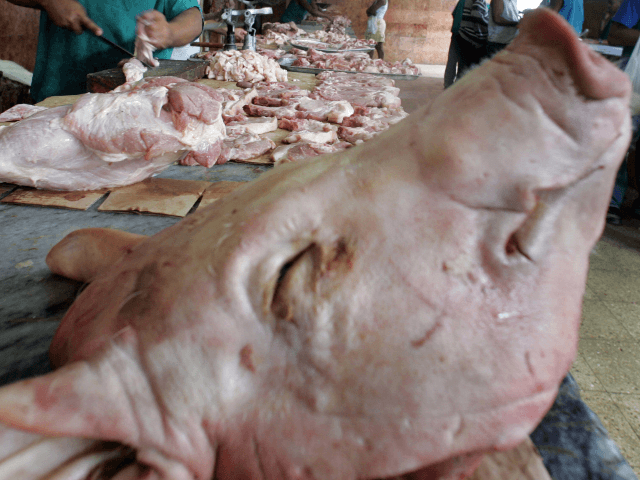The Patriotic Union of Cuba (UNPACU), one of the island’s largest dissident groups, published evidence of the Castro regime selling rotten meat to locals in eastern Santiago de Cuba at a market that has no functioning refrigeration, the Spanish newspaper Diario de Cuba reported on Sunday.
Diario de Cuba published a video interview by UNPACU members of Damaris Rodríguez Ramos, who shows the meat she ate onscreen – what appears to be beef, but clearly displaying signs of decomposition, turning purple and green.
Rodríguez tells UNPACU that she bought steak and ground beef at her local shop in Santiago.
“The neighbors told me that if I boiled it and threw away the water that I could consume it,” she explains. “The next day, I boiled a piece, I cooked it, and I tried it. I ate a little piece with bread. And look at how I am now. Since yesterday, my stomach is upset, I am vomiting, I have diarrhea.”
Rodríguez expressed fears that her relatives would have died if they ate it, and concerns for her own weakened medical state.
“I have diabetes, my mother had a brain aneurysm six months ago, my daughter is five months pregnant,” she explains. “I was the only one who ate that meat, to try it before giving it to them. I think they would have died, I would have been crying for the loss of my loved ones. This is prime meat, according to them.”
“Not even dogs should consume that,” she laments in the video.
According to Rodríguez, it can take up to four days for locals to have access to meat at the shop. Many wait hours on line in the summer heat to procure the rancid meat for their families.
“The store does not have refrigeration … When it has been repaired, it has been with the money of consumers because the state does not make itself responsible,” she notes. “They don’t care if somebody gets sick, dies, whatever. They just care if the product gets sold, good or not.”
UNPACU notes that the responsibility of ensuring the markets do not sell food that makes Cubans sick falls to the Interior Commerce Ministry and Minister Betsy Díaz Velázquez. Díaz has faced much of the island’s ire in the face of growing rations and shortages of basic food products, from meat and poultry to cooking oil and flour. Shortages began to become a problem for the communist state in December, when regime bureaucrats allegedly grossly miscalculated the amount of flour necessary to feed the nation. Rather than import the necessary 70,000 tons of flour (thanks to over half a decade of communism, the fertile island’s agriculture output is meager), officials only imported 30,000, leaving Cubans without flour during the Christmas holiday.
At the time, Cuba’s second-in-command, President Miguel Díaz-Canel, blamed “the impact of the embargo, which has strengthened under the Trump administration” for the shortages, despite other agencies of the Cuban government revealing the flour import mishap.
By January, impromptu protests began occurring on long market lines for food. Cubans caught on video shouting at officials, accusing Díaz-Canel of trying to “kill [them] with hunger,” began surfacing on social media. To manage the shortages, the regime imposed some of the strictest rations on citizens since the “Special Period” following the collapse of the Soviet Union. Late dictator Fidel Castro turned Cuba into a parasitic economy, a society that cannot survive without depending on a host state. Just as the fall of the USSR sunk Cuba into the “Special Period,” so too did the collapse of Cuba’s 21st Century host, Venezuela, bring about Cuba’s current economic crisis.
Cubans continued to protest, even turning hours-long market lines into a social media “challenge.” Citizens complained that procuring a small piece of chicken could take as long as four hours. The regime responded by banning photos at some shops and with absurd claims that the rations were popular and that it would soon replace beef and chicken with exotic “meats.”
“The hutía [a Caribbean rat species] has a superior level of protein to all other meats, include bovine, everything,” Commander Guillermo García Frías said on state television in April. “The ostrich produces more than the cow … one ostrich produces 60 eggs. From the 60 eggs, we can usually expect 40 chicks. Those 40 chicks contain 100 tons of meat.”
García Frías, 91, was not presented as having any known agricultural expertise relevant to the shortages, but he is a “hero of the Revolution.”
Díaz Velázquez, the interior commerce minister, appeared on state television in May to convince Cubans that they actually like the rations.
“There are a variety of different opinions, most consider these [rations] good and even insist on us continuing to ration products,” she said on Mesa Redonda (“Round Table”), the Castro regime’s flagship “current affairs debate” show.

COMMENTS
Please let us know if you're having issues with commenting.